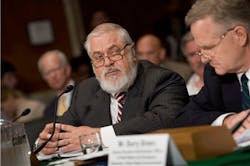House Committees: The Chemical Safety Board Puts the Public at Risk
Rep. Lamar Smith (R-Texas), chair of the House Science, Space and Technology Committee and Oversight and Government Reform Committee Chairman Darrell Issa (R-Calif.) released a joint staff report June 19 titled, “Whistleblower Reprisal and Management Failures at the U.S. Chemical Safety Board.”
“Failure of leadership at the Chemical Safety and Hazard Investigation Board (CSB) has led to infighting, secret agendas and retaliatory personnel policies,” said Smith. “These problems created a toxic work environment that resulted in the loss of a significant number of senior investigators.”
As a result, he added, CSB has conducted fewer investigations, which has “negatively impacted its mission to protect public safety.”
“Rather than addressing experienced investigators’ concerns about agency mismanagement, [CSB] leadership has stifled internal debate and retaliated against agency whistleblowers,” Issa added. “Mismanagement under the current CSB leadership has created a hostile work environment, distracting the board from fulfilling its core mission to investigate industrial accidents and issue incident safety reports in a timely manner.”
Issa called for “real reform” at CSB “to restore collegiality, staff morale and the integrity of the agency.”
CSB Chairperson Dr. Rafael Moure-Eraso said he was “disappointed, of course, to hear criticisms of CSB management during my tenure thus far but I plan to take these to heart and I want to assure all concerned I plan to work even harder in my last remaining year as chairperson to resolve management issues brought to our attention by the committee, as well as management recommendations made to us recently by the ranking member of the House Committee on Energy and Commerce, Rep. Henry Waxman.”
Seven Day Letter
On Sept. 5, 2013, the EPA Office of Inspector General (IG) sent Congress a “Seven Day Letter” regarding CSB. Such letters are rare and signal a severe problem at an Executive Branch department or agency. The Oversight and Government Reform Committee and the Science, Space, and Technology Committee launched an investigation after CSB leadership refused to cooperate with the EPA IG’s investigation into whether an employee in the U.S. Office of Special Counsel (OSC) revealed the identities of CSB employees who filed complaints with the OSC. If these allegations are true, the OSC employee could be subject to criminal prosecution.
The committees’ investigation revealed what they called “serious management problems and heavy-handed tactics at CSB, including evidence that Chairman Rafael Moure-Eraso, General Counsel Richard Loeb and Managing Director Daniel Horowitz have mistreated employees and created a toxic work environment. “
Through its investigation, the EPA IG also discovered that CSB leadership used non-official email accounts to conduct official business. CSB leadership also may have used non-official email accounts to avoid the investigative scrutiny of OSC and EPA OIG.
The deficiencies uncovered during the course of the investigation and outlined in the joint staff report led the Oversight and Government Reform and the Science, Space, and Technology committees to conclude that CSB is failing to fulfill its mission.
In addition, the House committees claimed that Moure-Eraso retaliated against whistleblowers. “As a result,” the committees noted, “all employees fear retaliation at the hands of the chairman.”
Not true, said Moure-Eraso. “I am unaware of any CSB employee who may have lost his or her job, grade or any pay, as a result of complaints made to the Office of Special Counsel. It just hasn’t happened.”
CSB Is ‘Expert Organization’
“Regardless of how CSB internal operations may be characterized by some, the fact is that the CSB is internationally known as an expert organization in chemical safety and prevention, having built a solid reputation by deploying to over 100 incidents since 1998,” Moure-Eraso countered. “These investigations have included over 700 new chemical safety recommendations to EPA, OSHA, state regulators, industry organizations, unions and companies. The CSB tracks recommendations to completion and has so far successfully closed 533 of them as “acceptable action,” or 75 percent. These actions make American businesses, workplaces and communities safer.”
Adding that, “The irony of the allegation of ‘mismanagement’ is this: In the past few years, the CSB has had the most challenging and important cases before it in its history,” Moure-Eraso noted several CSB investigations, including:
- A major investigation, requested and supported by bipartisan leaders in the House, of the Deepwater Horizon blowout and explosion in the Gulf.
- West Fertilizer in Texas, where a plant explosion killed 15 and devastated a town; the CSB was the first to call for stronger storage practices for ammonium nitrate, the fertilizer that caused the blast, leading Senate authorizing chairman Barbara Boxer to call the CSB “heroes” in 2013.
- An investigation at the Tesoro refinery in Washington State, revealing industry-wide problems in how the integrity of key refinery equipment is assured, leading the CSB to call on EPA to require companies to use safer technologies and materials of constructions.
- The release of two reports on the Chevron refinery fire in California in 2012, which endangered the lives of 19 refinery workers and sent more than 15,000 community residents to the hospital for exposure to smoke and fumes. Following the CSB investigation, California has begun a complete overhaul of its process safety regulations for refineries and chemical plants (California alone has 15 refineries) and has tripled the number of state process safety inspectors.
- A major investigation of the chemical tank rupture at Freedom Industries in West Virginia which contaminated the drinking water supply for 300,000 residents, sent hundreds to emergency rooms and shuttered businesses and schools.
“I can understand some of that criticism,” said Moure-Eraso. “But we are a very small agency charged with a huge mission of investigating far more accidents than we have the resources to tackle.”
About the Author

Sandy Smith
Sandy Smith is the former content director of EHS Today, and is currently the EHSQ content & community lead at Intelex Technologies Inc. She has written about occupational safety and health and environmental issues since 1990.
